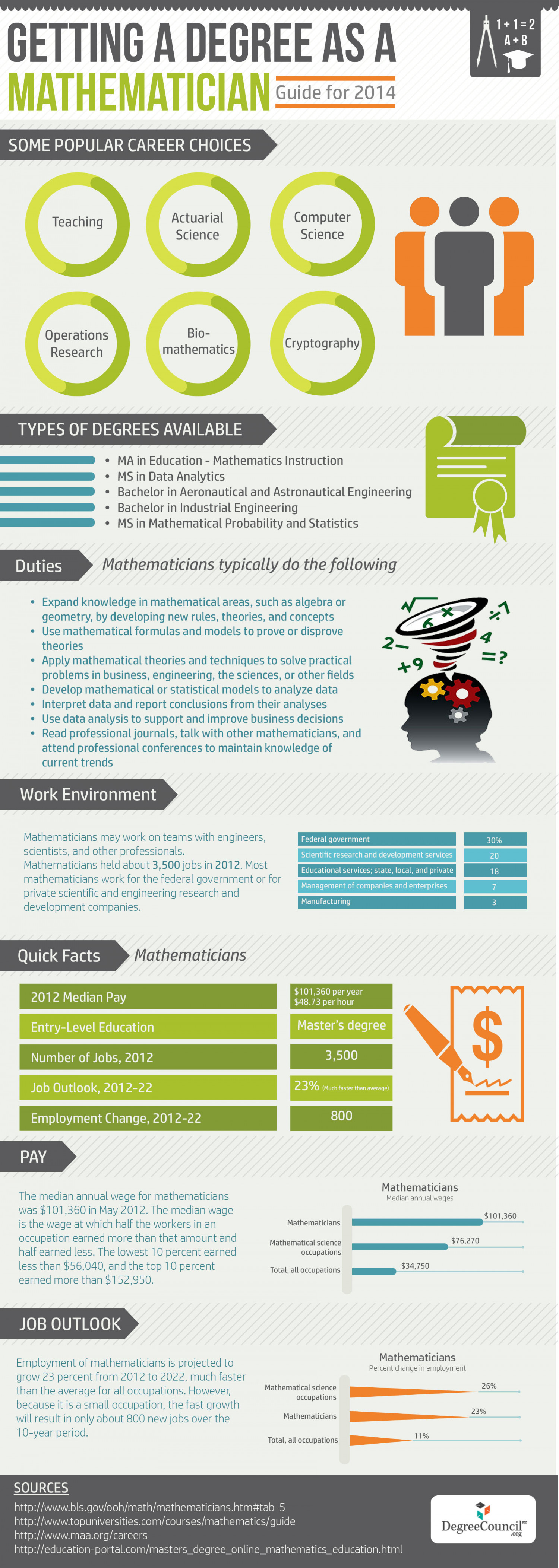
Mathematics Degree - Getting a Degree as a Mathematician: a Guide for 2014
1+1=2 GETTING A DEGREE AS A MATHEMATICIAN Guide for 2014 A +B SOME POPULAR CAREER CHOICES Teaching Actuarial Computer Science Science Bio- Operations Research Cryptography mathematics TYPES OF DEGREES AVAILABLE MA in Education - Mathematics Instruction • MS in Data Analytics Bachelor in Aeronautical and Astronautical Engineering Bachelor in Industrial Engineering • MS in Mathematical Probability and Statistics ////// Duties Mathematicians typically do the following Expand knowledge in mathematical areas, such as algebra or geometry, by developing new rules, theories, and concepts Use mathematical formulas and models to prove or disprove ÷7 theories 2- =? Apply mathematical theories and techniques to solve practical problems in business, engineering, the sciences, or other fields • Develop mathematical or statistical models to analyze data • Interpret data and report conclusions from their analyses • Use data analysis to support and improve business decisions • Read professional journals, talk with other mathematicians, and attend professional conferences to maintain knowledge of +9 current trends Work Environment Mathematicians may work on teams with engineers, scientists, and other professionals. Mathematicians held about 3,500 jobs in 2012. Most mathematicians work for the federal government or for private scientific and engineering research and development companies. Federal government 30% Scientific research and development services 20 Educational services; state, local, and private 18 Management of companies and enterprises Manufacturing Quick Facts Mathematicians 2012 Median Pay $101,360 per year $48.73 per hour 24 Entry-Level Education Master's degree Number of Jobs, 2012 3,500 Job Outlook, 2012-22 23% (Much faster than average) Employment Change, 2012-22 800 PAY Mathematicians The median annual wage for mathematicians was $101,360 in May 2012. The median wage is the wage at which half the workers in an occupation earned more than that amount and half earned less. The lowest 10 percent earned less than $56,040, and the top 10 percent earned more than $152,950. Median annual wages $101,360 Mathematicians Mathematical science $76,270 occupations $34,750 Total, all occupations JOB OUTLOOK Mathematicians Percent change in employment Employment of mathematicians is projected to grow 23 percent from 2012 to 2022, much faster than the average for all occupations. However, because it is a small occupation, the fast growth will result in only about 800 new jobs over the 10-year period. Mathematical science 26% occupations 23% Mathematicians 11% Total, all occupations SOURCES http://www.bls.gov/ooh/math/mathematicians.htm#tab-5 http://www.topuniversities.com/courses/mathematics/guide http://www.maa.org/careers http://education-portal.com/masters_degree_online_mathematics_education.html DegreeCouncil" .org
Mathematics Degree - Getting a Degree as a Mathematician: a Guide for 2014
Source
http://degre.../programs/Category
EducationGet a Quote









